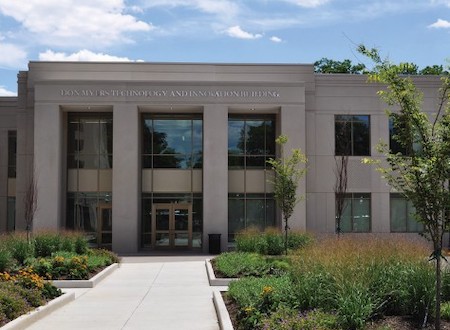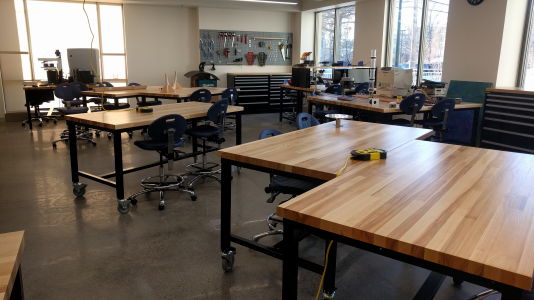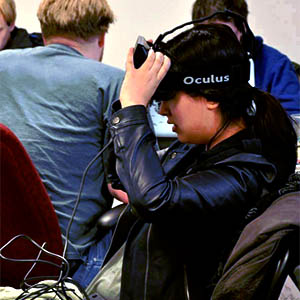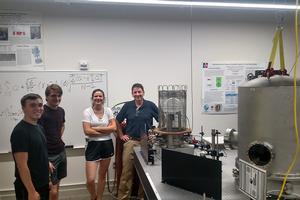Labs & Facilities

Don Myers Technology and
Innovation Building
DMTI is home to the departments of physics, mathematics and statistics, and computer science, as well as the AU Game Lab, the Kogod Center for Innovation, the Design and Build Lab, and more. DMTI features student collaboration and study spaces and fosters a community among CS, Physics, and Math-Stat students and faculty on campus.

Design and Build Lab
DMTI 101
Director: Gustavo Abbott; contact: dabl@american.edu
The Design and Build Lab (DaBL) is a digital fabrication / rapid prototyping / experimentation space located in the Don Myers Technology Building. DaBL is designed to empower and inspire students, staff, and faculty to create things to solve problems. Members of DaBL gain hands-on experience using both 21st and 20th century technology. Anyone with an active AUID can become part of the community; membership is free. Learn more about DaBL.
Data Science Lab
DMTI 212A
Director: Nathalie Japkowicz
The department of computer science's Data Science Lab develops and applies machine learning techniques to a variety of domains. Current areas of interest include: data stream mining, anomaly detection, concept drift, class imbalances, one-class learning. Current domains of application include: cyber-security, mobile traffic classification, and genomics. Learn more about the Data Science Lab.

Game Center
DMTI 113
Director: Andrew Phelps
The American University Game Center serves as a hub for experiential education, persuasive play research, and innovative production in the fields of games for change and purposeful play. Game Center students work side-by-side with faculty on Game Studio projects and participate in the world's leading games events. Learn more about the Game Center.
Xiao Lab: Computational Material Perception Laboratory
DMTI 204
Director: Bei Xiao
The Xiao Lab, also known as the Computational Material Perception Laboratory, focuses on research in human and computer vision, specifically, how to apply principles of human perception to improve machine perception and reasoning of physical properties of objects in complex and dynamic scenes through a combination of human psychophysics, crowd-sourcing, image synthesis and analysis, computer vision and VR techniques. Learn more about the Xiao Lab.
Lab for the study of Sensation, Perception,
Reality, and Illusion
DMTI 202
Director: Arthur Shapiro
The SPRI Lab focuses on the areas of visual perception and neuroscience, and topics related to color perception, motion, visual camouflage, and low-light-level vision.

District of Columbia NASA Space Grant Consortium
DMTI 206G
Director: Nate Harshman
Hosted by the Physics Department and administered by the National Aeronautics and Space Administration (NASA)
Our mission is to support NASA’s goals by contributing to STEM workforce development in the District of Columbia, utilizing the unique resources of our diverse affiliate institutions through programs in internships/fellowships/scholarships, research infrastructure, higher education, precollege, and informal education, to increase public knowledge, support educators, and attract and retain students to pursue STEM advanced degrees and careers. Learn more about DCSGC.

Center for Innovation
DMTI 219-221
AUCI helps current AU students from all across campus to gain a full understanding of the real world of business and markets by confronting, embracing, and creating opportunities—with the goal of achieving the highest levels of human flourishing and self–actualization. AUCI brings together prospective student entrepreneurs, educators, and experienced entrepreneurs to develop entrepreneurial mindsets, identify opportunities, refine business models, and launch new ventures. Learn more about the Center for Innovation.
Faculty Research Interests
- Stephen Casey: Complex Analysis, Harmonic Analysis, Differential and Integral Geometry, Number Theory. Applications to Computational Science and Signal, Information and Image Processing.
- Lei Ding: Cybersecurity, privacy, artificial intelligence.
- Alex Godwin: Information visualization, human-computer interaction, spatial data, social computing, community participation, ethical data science.
- Mary W. Gray: Survey sampling. Applications of statistics to law, education, economics, development, and human rights. Legal issues in information technology.
- Devin Green: DNA sequencing data, Gene interactions, Anti-microbial drug resistance, Antibiotic cycling, Discrete optimization, Graph Theory
- Nathalie Japkowicz: Machine Learning, Data Science, Big Data Analysis, Anomaly Detection, Data Stream Mining, Neural Networks. Application to Defense and Security, Cybersecurity, Medicine.
- Mark Nelson: Artificial intelligence, Game AI, Procedural content generation, Automated game design, Machine learning, AI and design, AI robustness.
- Mohammad Mehdi Owrang: Database Modeling, Intelligent Databases, Automatics Knowledge Acquisition, Data Mining on Medical Databases, and Breast Cancer Prognostic Modeling
- Art Shapiro: Computational and psychophysical models of color, motion, and scene organization. Graphics and illusions. Visual computation at low light levels. Human representation of information. Reality: constructed, perceived, augmented and virtual.
- Michael Treanor: Game design and game studies, Social simulation, Procedural content generation.
- Bei Xiao: Human perception, Computer vision, Tactile perception, Image analysis, Computer graphics. Human and machine perception of physical properties of objects.
